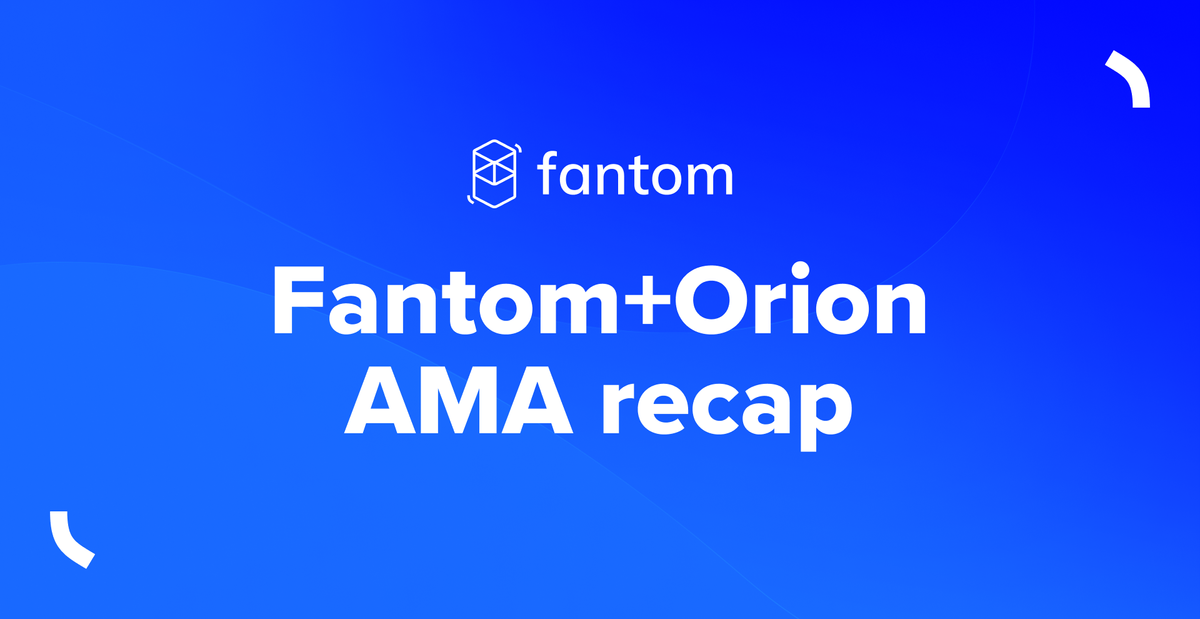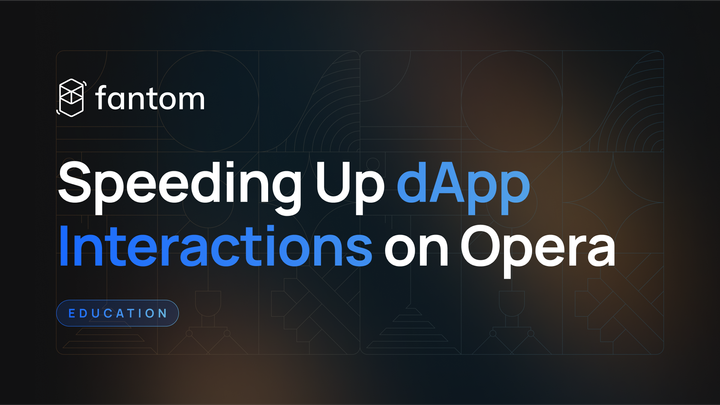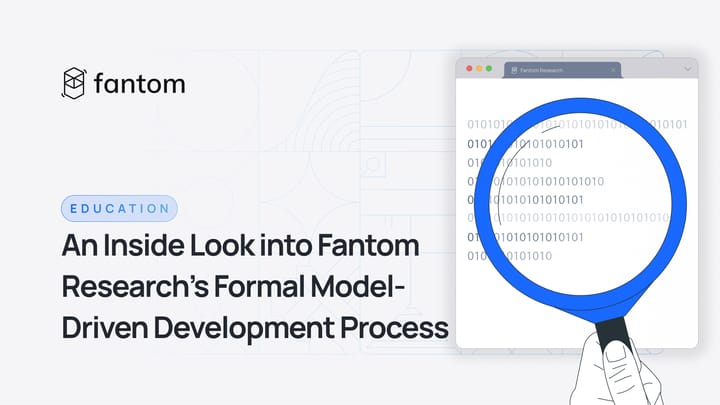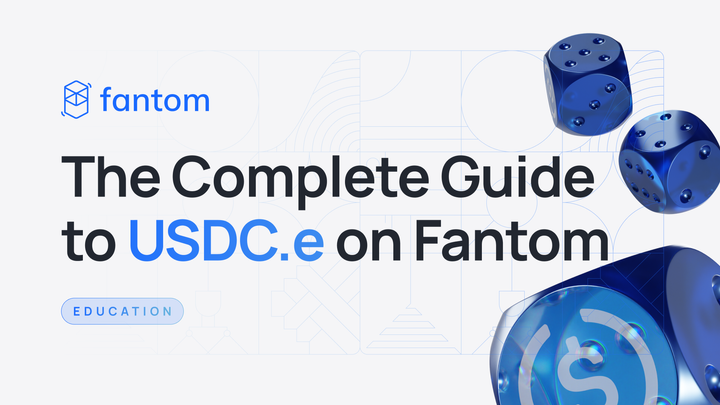Fantom and Orion Protocol AMA recap

On August 6, 2021, FTM Alerts held a live stream discussion with Timothea Horwell, CMO at the Orion Protocol, Simone Pomposi, Head of Marketing at Fantom, and John Morris, Director of US Operations at Fantom. This discussion followed an earlier conversation hosted by Orion protocol on August 4.
- Orion protocol is doing something that has not yet been done. Could you expand on what you are doing and how it is different from what has been done before?
- For John) What is the importance of liquidity aggregation. Why is what we are discussing here so much different?
- One unique thing about Orion is that you're not just aggregating DEX liquidity, which seems like a massive undertaking, but you're also integrating centralized exchange liquidity. Can you explain how you are able to do that?
- Orion put out an article talking about Fantom joining as a wallet SDK partner. We have also heard that the fWallet is going to have some major integrations. Why is Fantom the ideal partner to pilot the Orion SDK? How is this a benefit to the users of the Fantom ecosystem?
- Is it right to assume that once this integration happens, we're going to be looking for the ability to trade within the Fantom network at first until some sort of cross-chain jump is available to us?
- (For Simone and John) As you integrate apps into the fWallet, what is your endgame? What are you hoping that someone who visits the fWallet for the first time will be able to do?
- Many of us throw around terms like DeFi and NFT, but then we have this massive group, which I call the Coinbase Crew – which is not to say anything bad about Coinbase. But this group knows how to buy crypto with a credit card, they know how to store it on their little app, and that's pretty much all. But these are potential users of the Fantom Network who just need that barrier to entry to be lowered a little bit. It sounds to me like that's what both Orion and Fantom are doing.
- We have addressed so many questions. Is there anything that you would like to add?
1. Orion protocol is doing something that has not yet been done. Could you expand on what you are doing and how it is different from what has been done before?
Timothea: Orion is built on the most advanced liquidity aggregator ever developed and is aggregating the liquidity of the entire crypto market into one platform. This means access to liquidity, order-book depth, trading pairs of every centralized exchange, decentralized exchange, and swap pool in one place. Traders no longer need to waste time exchange hopping, nor do they need to worry about finding the best price. We have built a smart routing solution into our aggregator that finds the best prices and lowest fees on the market with almost zero slippage and zero spread. With Orion, further, traders no longer need to risk their assets to access liquidity. Traders can connect their wallets to the Orion portal and execute trades directly from their cold wallets without the need for any exchange account.
The biggest issues in the industry right now are fragmentation, centralization, and liquidity. We've seen tremendous growth in decentralized exchanges that face a lack of liquidity, which brings higher price discrepancies. Crypto is highly volatile, and one of the reasons is liquidity. We've reached a point where there is needed infrastructure to bridge siloed pools. This is critical if there is going to be mainstream adoption. In short, one might think of Orion as a meta-aggregator.
2. (For John) What is the importance of liquidity aggregation? Why is what we are discussing here so much different?
John: In my view, Orion has the power to supercharge crypto markets. Liquidity and volatility go hand in hand, and liquidity de-risks the markets. Suppose you can bring more liquidity to a market; you bring in bigger players, which helps run the entire ecosystem. Liquidity begets more liquidity. So liquidity reduces volatility. The second benefit is that liquidity lends support to assets. High volatility can make it hard to list assets. So it is easy to argue that without liquidity, innovation dies because businesses can't get out of the gate.
Simone, do you have anything to add?
Simone: Orion makes it easy for users to engage with the markets. We are going to get there, but I wish we could fast-forward to the time when users could just click and not think about where that liquidity is coming from because, as a user, I don't have to care if it's coming from SpookySwap, SpiritSwap, SushiSwap, or the moon! If I want to swap USDC for FTM, I just want to click a button. I want to make sure that the order gets filled and that the swap is instant. I want to make sure that the slippage is minimal, and that's it. I don't need or want to think about where the liquidity is coming from, and that's why I really like what Orion is doing.
3. One unique thing about Orion is that you're not just aggregating DEX liquidity, which seems like a massive undertaking, but you're also integrating centralized exchange liquidity. Can you explain how you are able to do that?
Timothea: This is important because, at the moment, many hybrid aggregators are popping up and promising access to Defi. But it's not decentralized because anyone on the market providing access to centralized liquidity still requires users to set up an account and complete KYC. Orion is unique in that we are offering decentralized access to centralized liquidity. We are the only platform on the market that allows a trader to trade across centralized and decentralized markets directly from their wallet. Our partner brokers make this possible, who are essentially conducting KYC so that traders don't have to. Although they are selected to trade on the trader's behalf, they never access traders' accounts. So it's really through these brokers that we're able to decentralize the liquidity of centralized exchanges. With increasing government lockdowns, it is critical that traders be able to access liquidity across centralized exchanges from anywhere in the world and across jurisdictions.
John: So it sounds like Orion distributes trading to broker partners who face the centralized exchanges and manage KYC over there so that the users on Orion systems do not have to do it.
4. Orion put out an article talking about Fantom joining as a wallet SDK partner. We have also heard that the fWallet is going to have some major integrations. Why is Fantom the ideal partner to pilot the Orion SDK? How is this a benefit to the users of the Fantom ecosystem?
Timothea: Orion fundamentally seeks to remove the friction in trading for users. We want users to trade directly from wallets they control, and we strive to enhance their experience. It was an easy decision to partner with Fantom because of the huge growth, the low transaction costs, and the network's speed.
John: For me, it's like mutual force-multiplication. Both sides are trying to "force multiply" what the other is doing. Orion is bringing together all of those disparate, isolated markets for Fantom companies. Fantom is trying to get that zero friction, ultra-fast, zero-cost experience to accelerate the process.
Simone: I will just reiterate what I said earlier, and also what John, you said the other day in the AMA, about Mike Kong's mantra, which is that it's all about user experience. In terms of Orion and Fantom, Orion, on the one hand, makes it easy for people to do what they want to do. Fantom serves as the infrastructure to allow that to happen.
As a user on Fantom, you're going to have an experience similar to using non-crypto (web-based internet) while still using tools in the blockchain space. If I go on Amazon, I can click and buy now. I don't have to wait for 5 or 10 seconds for a transaction to clear. Fantom allows for this experience already. One can think of Solana, Polygon, Avalanche, Near protocol, and similar networks with features like Fantom. I haven't tried them all, but I would say that I haven't yet found a platform that offers as seamless of an experience as Fantom.
Most importantly, at this point, the onboarding experience of Fantom is superior to any other platform. That being said, we support a huge cross-chain, multi-chain ecosystem. Maybe it's a question to ask, but I wonder if Orion would provide cross-chain liquidity. Let's take three high-performance blockchains, say Polygon, Fantom, and Avalanche. All three offer relatively high-speed transactions at low costs - especially Polygon and Fantom. Would it be possible for Orion to aggregate liquidity from protocols that are native just on Polygon or just on Avalanche to enable users on Fantom to get the best prices for assets on other chains?
Timothea: Yes, so this is something that we are working on. It's no small feat. We have spoken with other partners and developers, and it is something that we are building.
John: Link has just announced their CCIP, so we may not have to create this de novo ourselves. So we are always glad to work with close partners to leverage their technology and scale everybody in the process.
5. Is it right to assume that once this integration happens, we will be looking for the ability to trade within the Fantom network at first until some sort of cross-chain jump is available to us?
Timothea: Yes, chain-to-chain bridges are easy to create, and we've done so. So we will be able to add another layer to that integration.
6. (For Simone and John) As you integrate apps into the fWallet, what is your endgame? What are you hoping that someone who visits the fWallet for the first time will be able to do?
Simone: That's a great question. I like to approach the question by thinking long-term about the solution to the problem rather than the temporary hiccups. Let's say I have a magic wand: I would like people to access fWallet most seamlessly, without needing to think about private keys and private key storing and so forth. We're getting there with this. Also, I would like to move away from the word "wallet" because Fantom is building much more than a wallet. I would like to call it a Personal Finance Interface or something similar.
Calling it a Personal Finance Interface creates a story or expectation, and it tells you what you can do. It's not just staking and addressing governance proposals. It's so much more than that.
Regarding personal finance in crypto, we think about trading and swapping with AMMs, providing liquidity to liquidity pools directly from the interface, and managing and tracking those. There's lending and borrowing, which you would be able to do from the same interface. Then, of course, an NFT section where you can see them in your wallet and then possibly use one of your NFTs as collateral for lending or borrowing.
This is what I've thought about so far. Keep in mind that this all started about six months ago. Fantom now has almost 350k unique addresses. It was less than 300k just two days ago.
The growth is incredible, but it is still so early. But thinking ahead in terms of a year or two years, that's how I envision a Personal Finance Interface - formerly known as fWallet!
John: That is a pretty comprehensive answer, but the only thing I might add to the different layers mentioned would be on the currency side of the currency rail. As everyone probably knows, our strategy is wide open, so we want to empower partners with stablecoins that are on Fantom -- Tether, Gemini, and so on down the list, as well as our stablecoin. We are going for an all-in-one service.
7. Many of us throw around terms like DeFi and NFT, but then we have this massive group, which I call the CoinbaseCrew – which is not to say anything bad about Coinbase. But this group knows how to buy crypto with a credit card, they know how to store it on their little app, and that's pretty much all. But these are potential users of the Fantom Network who just need that barrier to entry to be lowered a little bit. It sounds to me like that's what both Orion and Fantom are doing.
Simone: Absolutely, and just a quick note about that. There's something that people underestimate and don't take into consideration, which is that if they think that they can't do something, they assume that it's their fault and their inability to interact with user interfaces. If, as a user, I encounter any barrier, it's not me; it's an external cause. So basically, we need to make things super simple to the point where the experience is similar to the people who use Coinbase. We have to get to that level of user experience in crypto in general. That's what we're focused on at Fantom.
Of course, things will get better industry-wide, but we can't think right now that the DeFi space is as good as it's going to get because it's not. It's a headache. It's a mess and terrible from the user experience standpoint. But when you know there are barriers, there are also incredible opportunities. There's a huge firewall that keeps most users out. If we really want the mass adoption that we're working towards, and if we really want to change lives, we need to bring down the wall.
John: I'm not the wallet expert in the room by a long shot, but I think the incumbent that everyone will ultimately sort of gobble up is the Metamask crew and not the Coinbase Wallet crew. The Coinbase Wallet people like Nancy and Syd are incredibly dynamic. Watch out for them as they are doing great things.
At Fantom, we're not trying to compete with them, but we are trying to offer similar experiences because the pie is pretty big, and the fact that MetaMask is our best alternative out there is a little dissatisfying. It works well, and it's safe, but we can do better.
8. We have addressed so many questions. Is there anything that you would like to add?
Timothea: I am excited to bring Orion to Fantom users. We are seeking to enable users to trade within their wallets across decentralized and centralized exchanges. It's exciting to get this to Fantom and to work with you on the fWallet.
John: I would like to encourage our community to keep a close eye on Orion and to use their services as well. This call was really about trying to help foster the growth of Orion, and I would say that if Orion achieves the goals we think it can, everybody is a beneficiary. Whether it's Spooky, Spirit, Reaper, or Steak... That liquidity will benefit everybody. It'll de-risk the markets; it will foster innovation and do things we haven't even thought about. Thank you, Orion, and we'll help you in any way we can.
Timothea: Well, I'm glad that you mentioned the ecosystem because once we integrate, we'll be able to access those protocols from fWallet, so it's hugely beneficial.
If you haven't checked out Orion protocol, we strongly recommend that you do so. It's a partnership that will pay huge dividends for Fantom.



